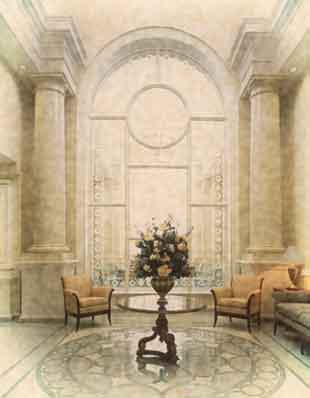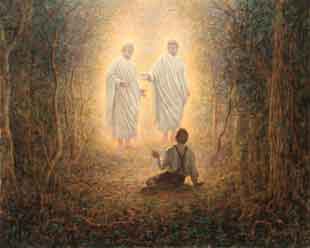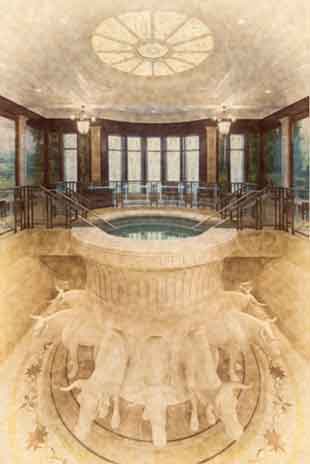
When we read in D&C 124:30 referring to baptism for the dead «For this ordinance belongeth to my house…» it tells us of their personal dependencies. It brings us into the intimacy of His abode. In that section we also read «and for your oracles in your most holy places wherein you receive conversations…». (39) All this makes us think that the temple is the habitation of the heavens.

Something that catches our attention is the order of its interior. It is different from the outside world. The hierarchies assumed in our normal life do not exist there. In my work I have several bosses over me and I have responsibility over others. Assuming that makes me understand things in terms of power of decision or compliance. Even in the church there is a very definite hierarchy of leadership, even though its terms are different from my work. But ultimately a line of authority.
In any group, there is a class hierarchy (unofficial, but de facto). There are those who have been successful and those who haven’t or haven’t been so successful. Successful at work, in the economy or in the family. And although it is not promulgated or encouraged, within ourselves, we place ourselves in the place that naturally corresponds to us.
In the temple we don’t find that. The society that exists there is strange. These aspects are indistinguishable among its inhabitants. It is like experiencing the death of a part of us. Let’s say that we die at the entrance and pass stripped of everything inside. Once we cross the door, we only carry our recommendation. All identical, there is no visa-gold recommendation. There is no mention of charge or call. All our status, is simplified in the soul of a person.
The sociability of the heavens
When we read that «the same sociality which exists among us here will exist among us there…» (D&C 130:2) we can infer that the most similar sociability to the one over there, is not the one that exists in our work, not even in the church (which is influenced by the world it inhabits) but that of the temple. For the temple does not belong to the order of the world, but to its house. To study this aspect of its interior is to access the heavens through the eye of a keyhole.
The temple, embassy of the heavens

We do not enter the temples, but are admitted into them. This shows that access is similar to crossing the border of another country. We go to a place that does not belong to our daily experience. Just as the embassies, which are on the ground of the host country, nevertheless enjoy its sovereignty. They do not belong to the order that exists outside their headquarters. In the same way, when we are admitted in the temples we pass to the «sovereignty» of their house, even though it is in this world where they are built.
Similarly, in the temple, embassy of heaven, we need a recommendation endorsed by the bishop. It certifies that we accept the laws of its interior and that our conduct goes according to the requirements. This protocol transmits to us the image of a similar one in heaven: where he without the requirements «it cannot be received there, because the angels and the gods are appointed there, by whom they cannot pass…». (D&C 132:18)
The moment where they connect the world outside and the world inside we see it when we deliver our recommendation in the reception of the temple. Past that procedure, the world outside disappears. Our position on the scale of power evaporates, the appearance ceases to matter. Our appeals do not count. We are governed by the time of ordinances – The space of our interest extends into the future like that of Abraham «for the benefit of [our] posterity that shall come after [us]» (Abraham 1:31). To the past also with Elijah the Prophet, «unto whom I have committed the keys of the power of turning the hearts of the fathers to the children, and the hearts of the children to the fathers» (D&C 27:9).
It all begins once they have been admitted and when they take a single step beyond the counter.
The importance of our body

The importance of the body in the theology of restoration is surprising. When most consider it a source of sin or «the prison of the soul» as Plato taught, we say that God has one. I believe we are unique in that. In temples the body is the tool of work. Without them, nothing could be done. And I emphasize this. The work of the temple is not virtual, there is a very serious effort to materialize all the ordinances. The same eagerness of the Father in which we take a body in a physical world. They are not acts for groups or collectives of ancestors. But for each one. One by one. Their rituals and instructions are administered to each living or dead individual.

This ministry is not only mental, but also corporal because «spirit and element, inseparably connected, receive a fulness of joy; And when separated, man cannot receive a fulness of joy» (D&C 93:33-34) A novel concept for the majority.
The vicarious work, allows us to learn from our body, since it is shown in the realization of the ordinances, more knowledge than we can understand. In this way, we are grateful to be able to observe in our body the form of his salvation and read his scriptures at our joints. In this way, it allows us to express ourselves in their ordinances and to spread our light in space.
Our memory is associated with what we do forming a tapestry that extends only inside us and «garnish thy thoughts unceasingly» (45) All this happens with our body and in fact sometimes inspiration comes «but whether in the body or out I cannot tell.» (D&C 137:1) Such is the intimacy of the latter with learning.
Divine matter
The temple shows in its design a complete acceptance of the body. There is a dining room, changing rooms, toilets (very clean) soap, towels, clothes… This shows that the society of the heavens contemplates the totality of who we are with frankness and naturalness. Having assumed the body as something divine and admirable. The temple and society of the heavens elevate matter to the heavenly.
The modesty in the garment reminds us that there is also a censorship in the cosmos and its enigmas. Divinity is clothed. And just as in the ordinance of marriage it initiates us to unveil its mysteries, the other ordinances gradually teach us that «the mystery of godliness, how great is it!» (D&C 19:10)
Los movimientos en su interior

In D&C 121:46 we read of a heavenly motion«…thy dominion shall be an everlasting dominion, and without compulsory means it shall flow unto thee forever and ever.» This very advanced movement is not to be found on the outside. In our world everything must be compelled or pushed toward us if we are to have dominion. The movements within the temple are fluid because they pertain to the order of a heavenly society and to sovereignty in its embassy. The leadership inside is light, different from outside. Everything operates as an extension of our desires. Inside, a soft version of the principality is fulfilled. Everything and everyone in the temple is at the service of our dominion and we must not push it to flow towards us.
There the least of all feels vital. For our dominion is eternal, in administering the ordinances of salvation to our ancestors. Each one of the assistants is a knot of power where the interests of thousands of relatives who depend on our principality and its administration converge. That sensation so different from that of the outside, where the hierarchies of power place us irremediably in the niche that corresponds to us, disappears in the temple. In its place appears little by little «[our] confidence wax strong in the presenceof God; and the doctrine of the priesthood shall distil [our] soul as the dews from heaven.»(45)
In that principality within him, our way resembles his «whose course is one eternal round,» (D&C 35:1). Thus our activity orbits again and again around the ordinances for each ancestor. In each of these revolutions, time after time, «continueth in God, receiveth more light; and that light groweth brighter and brighter until the perfect day.» (D&C 50:24)
The wake of Abraham

Although we work in the company of others performing similar tasks, nevertheless we are alone before the harvest of the stars. A sky of billions of ancestors. Because the temple places us in front of Abraham’s cosmos and our steps rest on the «paved work of pure gold, in color like amber.» (102:2), which are the ordinances of the house of Israel. Their task is not only to «giveth light unto all that are in the house», but also to «the immensity of space» (D&C 88:12).
Coming from our modern land of the Chaldeans, we enter the temple because «we seek another place to dwell» (Abraham 1:1), deep down we all «confessed we are strangers and pilgrims on the earth» (D&C 45:13). Instinctively, as creatures in transit, we feel the silent orientation that leads us to «the rock whence ye are hewn, and to the hole of the pit whence ye are digged». (Isa.51:1) In Abraham’s quarry, those who flow into the temple halls are those whom Lehi saw tasting the fruit of the tree. They find «greater happiness and peace and rest for them, they sought the blessings of the fathers, and the right to which they were to be ordained» (2). In that society of the heavens, they are invited «to be one who possessed great knowledge, and to be a greater follower of righteousness, and to possess a greater knowledge» (2).
We are prepared [to be fathers and mothers of many nations, princes of peace,] (2). Like Abraham, in the vicarious work, those considered weak in the modern land of the Chaldeans are at the head of their generation. They are those who desire «to receive instructions and to keep the commandments of God» (2). They seek the legitimacy of the heavens «in order to administer it» (2).
Ploughing the principality

When we read at home or in the church, «No power or influence can or ought to be maintained by virtue of the priesthood, only by persuasion, by long-suffering, by gentleness and meekness, and by love unfeigned.» (D&C 121:41) We understand its meaning in relation to our environment. But, dear reader, if we read this very thing in the temple, how do we understand it? equal?
In its atmosphere of silence and reflection we can perceive the soft chords in a different way of understanding the scriptures. There is an «augmented reality» within its walls that is accessed if we abandon our treasures and jewels in Jerusalem. That is, forgetting the understanding of the modern Chaldeans. Abraham had to leave Ur, Lehi Jerusalem and us the everyday world to extend our tent in the embassy of the heavens.
No power, not even his own, can be maintained except by persuasion, by long-suffering, meekness, and sincere love. That is your honor. Therefore his dominion «without being compelled [flows] toward [him] forever and ever» (46). His sincere love shines in the darkness «and giveth light to all thath are in the house» of creation (Matt. 5:15). He lets his light shine before intelligences great and small, and they see his good works and glorify the Father who is in heaven (16). The power of his word lies in the loyalty of his eternal allies, like light and truth. All marvel at his knowledge and benignity.
By his persuasion and meekness all the creations, which were in the beginning «without form, and void» (Moses 2:2) were carried from the face of the abyss to the light. They patiently «watched those things which they had ordereduntil they obeyed.»(18) and «then showing forth afterwards an increase of love toward [them] whom [they] hast reproved» (121:43).
A strange land
In the temple we can work on this key. But only if we recognize it and leave the land of the Chaldeans, even if it takes us «from the house of [our] father and of all [our] kindred» (16). Yes, and lead us to the ordinances of his house, as neophytes, «into a strange land which thou knowest not of».
It is when Abraham accepts the terms of the covenant with Jehovah that he actually understands the cosmology of the Lord and the covenant he makes with Him. Covenant brought back April 3, 1836 at Kirtland Temple.

Dejar una contestacion